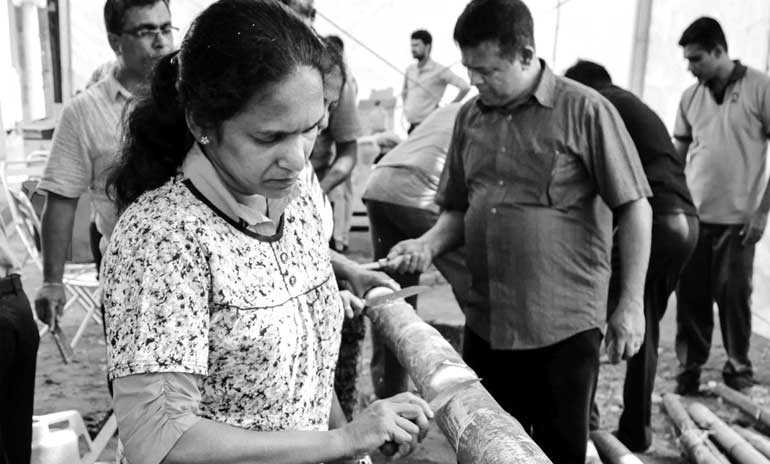Friday Feb 20, 2026
Friday Feb 20, 2026
Saturday, 15 June 2019 04:02 - - {{hitsCtrl.values.hits}}

A Sri Lankan artisan works on a bamboo stem during the first phase of pioneering UNIDO training program for Sri Lanka’s bamboo craftsmen held in Colombo in early 2019
After the successful and pioneering training for Sri Lanka’s bamboo craftsmen in early 2019, the second phase of the program will take off in Colombo today, 15 June.
The project, pioneered in early 2019 by UNIDO, introduces international bamboo craft expertise for local craftsmen for the first time. Launched by the United Nations industrial Development Organization (UNIDO), it is also guided by URAVU (Indigenous Science & Technology Study Centre) of India.
The three-phased training program is part of the ‘Bamboo Processing Sri Lanka’ project aimed at Sri Lanka’s bamboo supply chain.
‘Bamboo Processing Sri Lanka’ is a project launched by UNIDO, funded by Global Environment Facility (GEF) and in collaboration with the Ministry of Industry and Commerce. The objective of this project is to develop a bamboo supply chain and product industry in Sri Lanka.
As an essential step of this project, UNIDO, in collaboration with IDB, launched the bamboo training program in early 2019. The objective of this training program is to build the local capacities and transfer the necessary knowledge needed to work with bamboo, develop its sector, and create an eco-friendly practice in bamboo processing.
The first training held in January 2019 focused on sharing the knowledge behind bamboo preservation and treatment methods, which allowed beneficiaries to learn the skills of preservation while launching a value added product to the market.
Pursuant to the first successful workshop, UNIDO and IDB have decided to continue building local capacities by leading the next step in bamboo processing knowledge. The second workshop that commences today, 15 June, focuses entirely on basic bamboo handcraft techniques. The objective is to build a fundamental understanding of bamboo handcrafts and technology.
The training will conclude on 25 June at IDB premises. Forty local artisans from different provinces of the island are participating and being guided by URAVU India.
The artisans selected to be part of the bamboo handcraft training are not only those who already use bamboo but also artisans who are skilled in working with wood, rattan, and similar materials. In addition, this training is to serve as a base on which to develop a second more advanced training scheduled for July 2019, and focused on bamboo product and furniture making.
These workshops intend to share conscious knowledge to build strong capacities and promote the utilisation of bamboo as a substitute for wood, while tackling deforestation and creating innovative and sustainable products.